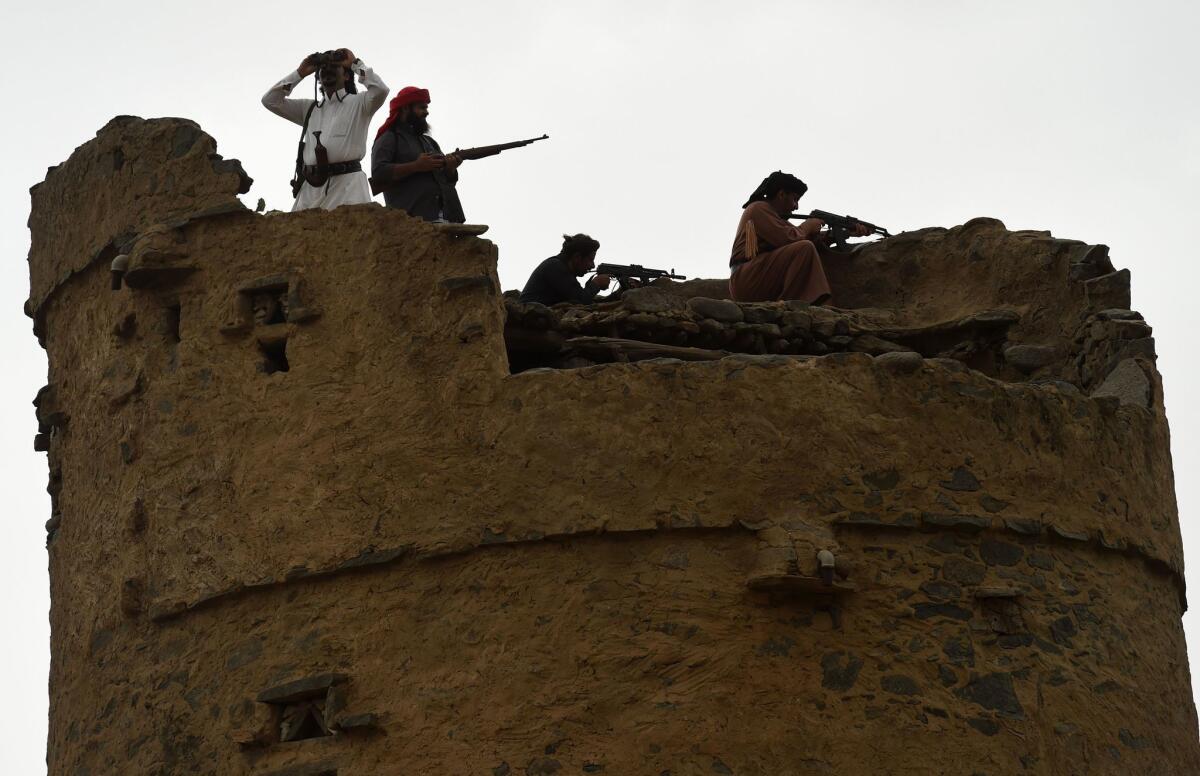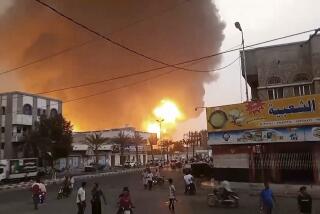Airstrike reportedly kills Al Qaeda leader in Yemen

An airstrike has killed a key leader of the militant faction known as Al Qaeda in the Arabian Peninsula, according to an online posting Tuesday from the Yemeni-based group.
A message released on Twitter said that Ibrahim Suleiman Rubaish, a former inmate at the U.S. military prison at Guantanamo Bay and a top religious figure for the Yemeni-based extremist group, was killed Monday in a “hate-filled Crusader strike,” according to the SITE Intelligence Group, which monitors militant Web traffic. The posting did not say where the strike occurred.
The death of Rubaish, a charismatic figure who exhorted Muslims to wage holy war against enemies in the West and elsewhere, would be a considerable blow for Al Qaeda.
A veteran of the Afghanistan war, Rubaish was a senior Al Qaeda ideologue and outspoken recruiter whose fiery exhortations often appeared in official Al Qaeda pronouncements.
Rubaish’s reported death may be an indication that the U.S. drone strikes in Yemen are continuing, despite the evacuation of U.S. military personnel as the nation’s security situation has deteriorated.
There was, however, no immediate comment from U.S. officials, who had offered a reward of up to $5 million for information leading to the arrest of Rubaish, a Saudi national.
A Saudi-led alliance has been launching daily aerial attacks in Yemen against Houthi rebels, who are implacable adversaries of Al Qaeda.
The Obama administration has conducted a series of covert drone strikes targeting leaders of the Al Qaeda faction in Yemen, which U.S. officials view as among the most powerful branches of the terrorist network. The campaign has killed many Al Qaeda operatives, but has also caused civilian casualties, drawing denunciations in Yemen and abroad.
Before Yemen began to veer toward civil war late last year, the White House often cited the Arab nation as an example of the success of its counter-terrorism strategy.
The Al Qaeda affiliate in Yemen has been linked to a number of strikes targeting Western nations, including the deadly attack on the Paris offices of the satirical magazine Charlie Hebdo in January, and a thwarted attempt to blow up a U.S. airliner on Christmas Day 2009.
Last month, neighboring Saudi Arabia and allied Sunni Arab nations launched their bombing campaign targeting Yemen’s Houthi rebels, a predominantly Shiite Muslim group that has seized the capital, Sana, and is advancing elsewhere in Yemen. The nation is now engulfed in warfare amid fears of a humanitarian catastrophe in the Arab world’s poorest nation. A United Nations-led mediation effort has broken down.
Saudi Arabia views the Houthis as a proxy of archrival Iran, a predominantly Shiite nation. Tehran has denied arming the Houthis and has called for an end to the Saudi-led bombing and for the formation of a new government in Yemen.
Security experts have voiced fears that the escalating conflict in Yemen could benefit Al Qaeda, which has reportedly made advances since the Saudi bombing campaign began. U.S. officials have backed the Saudi aerial attacks, and Washington has said it is hastening arms shipments to the Saudi-led alliance.
The Houthi rebels have vowed to destroy Al Qaeda in Yemen. Al Qaeda also seeks the fall of the Saudi monarchy. But the Houthis have accused the government in Riyadh of providing funds and weapons to Sunni tribes in Yemen linked to Al Qaeda.
Special correspondent Nabih Bulos in Amman, Jordan, contributed to this report.
Follow @mdcneville for news from the Middle East
More to Read
Sign up for Essential California
The most important California stories and recommendations in your inbox every morning.
You may occasionally receive promotional content from the Los Angeles Times.





